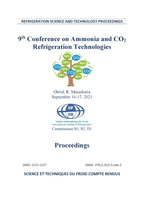
Recommended by the IIR / IIR document
CO2 refrigeration system design and optimization for LNG driven cruise ships.
Number: 0015
Author(s) : SAEED M. Z., HAFNER A., GABRIELII C., TOLSTOREBROV I., WIDELL K. N.
Summary
The cruise industry is in the evolution of eco-friendly technologies due to strict environmental regulations. Liquified natural gas (LNG) is an alternative marine fuel. Compared to conventional diesel fuels, LNG offers a reduced environmental impact and can serve as a transition towards zero emission. LNG is stored in onboard cryogenic tanks at low temperatures. Various techniques can be applied to vaporize the LNG fuel before feeding it to the gas engine. The recovery of this vaporization energy with air conditioning as a heat source can enhance system performance. On a cruise ship, heating, cooling, and ventilation (HVAC) require an average 40 % of the ship's total energy demand. The natural refrigerant CO2 is an attractive choice due to its compact units, non-toxic nature, and non-flammability, all being primary concerns on a cruise ship. The energy efficiency can be improved by utilizing LNG cold and reducing the need of indirect loops with CO2 as a refrigerant. This work investigates the LNG cold, waste heat recovery potentials, and CO2 refrigeration system for cruise ships.
Available documents
Format PDF
Pages: 8
Available
Public price
20 €
Member price*
Free
* Best rate depending on membership category (see the detailed benefits of individual and corporate memberships).
Details
- Original title: CO2 refrigeration system design and optimization for LNG driven cruise ships.
- Record ID : 30028952
- Languages: English
- Subject: HFCs alternatives
- Source: 9th IIR Conference on Ammonia and CO2 Refrigeration Technologies. Proceedings: Ohrid, North Macedonia, 16-17 September, 2021
- Publication date: 2021/09/16
- DOI: http://dx.doi.org/10.18462/iir.nh3-co2.2021.0015
Links
See other articles from the proceedings (31)
See the conference proceedings
Indexing
-
Themes:
CO2;
LNG and LPG;
Marine transport - Keywords: CO2; R744; Ship; LNG; Energy efficiency; Case study; Cooling
-
Innovative refrigeration concept for passenger ...
- Author(s) : PARDIÑAS A. A., SELVNES H., GABRIELII C., SAEED M. Z.
- Date : 2022/06/13
- Languages : English
- Source: 15th IIR-Gustav Lorentzen Conference on Natural Refrigerants (GL2022). Proceedings. Trondheim, Norway, June 13-15th 2022.
- Formats : PDF
View record
-
Analysis of methods to improve the energy effic...
- Author(s) : KHMELNIUK M., TRANDAFILOV V. V., YAKOVLEVA O., YALAMA V.
- Date : 2024/09
- Languages : English
- Source: 11th IIR Conference on Compressors and Refrigerants.
- Formats : PDF
View record
-
Der Beitrag der Erdgasverflüssigung zur Versorg...
- Author(s) : FÖRG W.
- Date : 1998/11/18
- Languages : German
- Source: DKV-Tagungsbericht 25. 1998, Würzburg.
View record
-
Small-scale LNG in Europe: LNG ship concepts.
- Author(s) : ØSTENSTAD J.
- Date : 2005/09/29
- Languages : English
- Source: 1st International conference on small-scale LNG in Europe. Conference presentations [CD-ROM].
View record
-
Innogas: cost-efficient maritime small-scale di...
- Author(s) : MEEK-HANSEN B.
- Date : 2005/09/29
- Languages : English
- Source: 1st International conference on small-scale LNG in Europe. Conference presentations [CD-ROM].
View record
